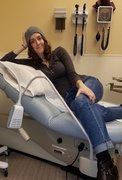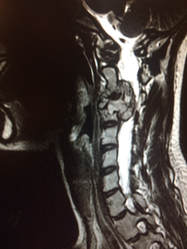New - Understanding chordoma and about the Chordoma Foundation here. (psssst: look on page 2). More about this extremely rare cancer is below. We thank you for your love, support and prayers.
If you're interested in reading about her journey and seeing current pictures, click the Blog-Madison's Journal link.
If you're interested in reading about her journey and seeing current pictures, click the Blog-Madison's Journal link.
|
2013: A broken neck. Emergency surgery was required to stabilize her spine and remove a "harmless looking mass". Pathology concluded what seemed completely impossible... poorly differentiated chordoma
|
In 2014, The Real Journey Began
Madison disliked the term fighting cancer. It's not a fight from her/our view, it's a ride and she was a passenger with a paddle, upper right. Madi, friends, family, and numerous globally recognized chordoma specialists all paddled like crazy but in the end couldn't save her, but what a ride
|

Jan 2017, entered a clinical trial in San Francisco to treat a very aggressive metastasis.Wait, what?! She didn't even look sick!
The trial was effective with the existing tumors but unfortunately did not prevent new ones from growing about six months in to the trial. Jan 2017: a metastasis: enrolled in a clinical trial in San Francisco. January - July, 11 trips, 2-4 required monthly.
July 2017: Madison was removed from the trial given advanced disease progression. Aug 2017: Tried the last potential treatment options which did not stop the disease progression. Sept 2017: What's next here, and here, and finally here Jan 2018: Sadly, Madi passed-on peacefully at home with moms and dad by her side. More here and here. |
Understanding This Disease
Chordoma is an extremely rare and malignant cancer that occurs in the bones of the skull and spine. It is part of a family of cancers called sarcoma, which include cancers of the bones, cartilage, muscles and other connective tissue.
» Location: bones of the skull base and spine
» Incidence: 1 case per million diagnosed annually
» Types: conventional, chondroid, dedifferentiated, and poorly differentiated which is the rarest and most aggressive
» Average Age of diagnosis: 58. Of them, 62% are men and 38% women
» Approved Drugs: none, but research is accelerating very quickly thanks to the Chordoma Foundation.
Madi's Type/variation: poorly differentiated, only ~5% of the already rare one in a million, so 1 in 20,000,000... about 15-20 new cases in the US annually.
You can read about Madi's "journey" on the Blog/Journal Page


